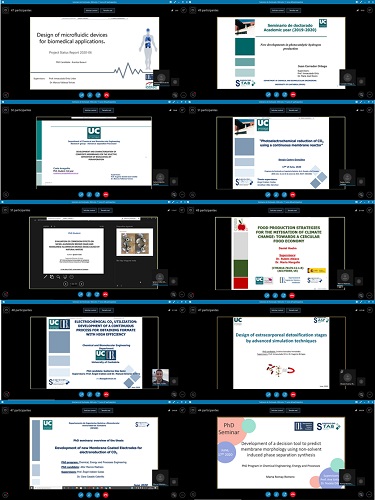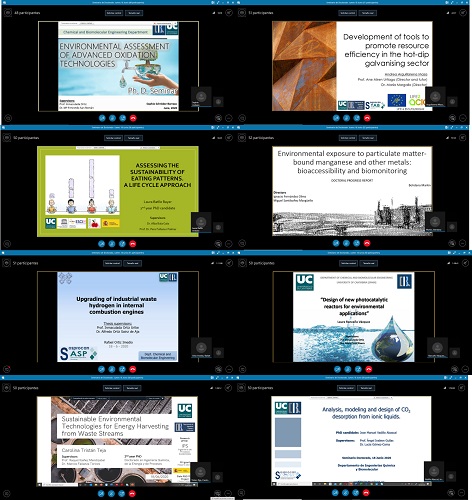The Chemical, Energy and Process Engineering Doctorate Program organized the anual Doctoral Seminars. The aim of these seminars is to promote the training of PhD students and disseminate their research activities. The seminars, open to the members of the doctorate program and to general public, included the assessment of the doctorate students´progress by the academic panel of supervisors. This year, due to the current situation about COVID-19, the seminars took place through Skype Business app, on June 17 and 18, 2020.
The first session was dedicated to 3rd/4th year Phd. students. During this session the presented works were:
Design of microfluidic devices for biomedical applications – by Arantza Basauri
New developments in photocatalytic hydrogen production – by Juan Corredor
Development and characterization of composite membranes for the selective separation of bioalcohols by pervaporation – by Carla Arregoitia
Photoelectrochemical reduction of CO2 using a continuous membrane reactor – by Sergio Castro
Evaluation of corrosion effects on nickel aluminium bronze (NAB) and manganese aluminium
bronze (MAB) caused by natural Waters – by Ignacio Cobo
Electrochemical CO2 utilization: development of a continuous process for obtaining formate with high efficiency – by Guillermo Díaz
Design of extracorporeal detoxification stages by advanced simulation techniques – by Cristina González
Food production strategies for the mitigation of climate change: towards a circular food economy – by Daniel Hoehn
Development of new Membrane Coated Electrodes for electroreduction of CO2 – by Aitor Marcos
Development of a decision tool to predict membrane morphology using non-solvent induced phase separation synthesis – by Marta Romay

During the second session, on June 18, PhD. students of 2nd year presented the works:
Development of tools to promote resource efficiency in the hot-dip galvanising sector – by Andrea Arguillarena
Evaluación de la sostenibilidad de los hábitos alimentarios. Un enfoque de ciclo de vida – by Laura Batlle
Environmental exposure to particulate matter-bound manganese and other metals: bioaccessibility and biomonitoring – by Bohdana Markiv
Upgrading of industrial waste hydrogen in internal combustion engines – by Rafael Ortiz
Design of new photocatalytic reactors for environmental applications – by Laura Rancaño
Environmental Assessment of Advanced Oxidation Technologies – by Sophie Schröder
Sustainable Environmental Technologies for Energy Harvesting from Waste Streams – by Carolina Tristán Analysis, modeling and design of CO2 desorption from ionic liquids – by Jose Manuel Vadillo

The last session, joined the 1st year PhD. students also on June 18. The presented works were:
Advanced regeneration technologies for the environmental impact mitigation of fluorinated gases – by Salvador Asensio
Development and characterization of 3D biopolymeric membranes functionalized with graphenebased nanomaterials and their integration in perfusion bioreactors for in vitro neural models – by Marián Mantecón
Recuperación y purificación de disolventes en la industria farmacéutica – by Álvaro Martín Quijano
Recuperación y purificación de disolventes en la industria farmacéutica – by Estela Abascal
Challenges in the implementation of photocatalysis for environmental applications – by Carmen Barquín
Continuous synthesis and functionalization of magnetic nanoparticles – by Belén García
Renewable Energy – Hydrogen coupled system for public social housing power supply – by Víctor Manuel Maestre
